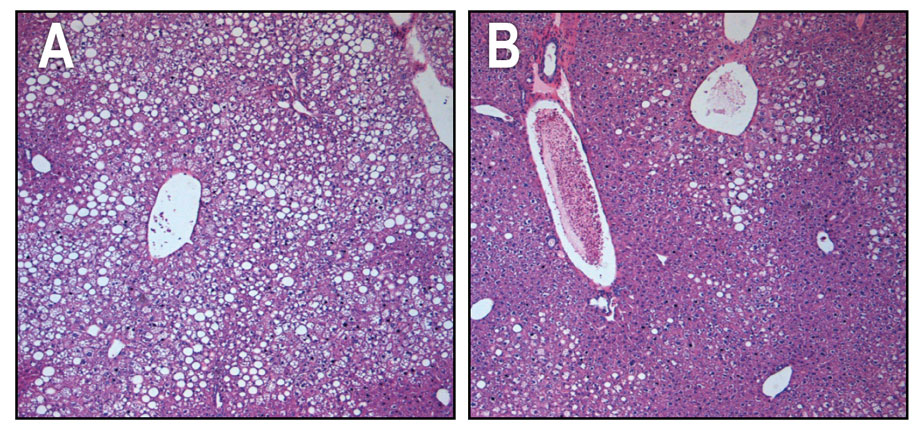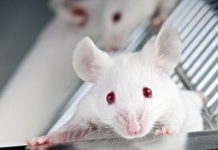In mice with diet-induced diabetes—the equivalent of type 2 diabetes in humans—a single injection of the protein FGF1 is enough to restore blood sugar levels to a healthy range for more than two days. The discovery by Salk scientists, published in the July 15 online issue of the journal Nature, could lead to a new generation of safer, more effective diabetes drugs.
The team found that sustained treatment with the protein doesn’t merely keep blood sugar under control, but also reverses insulin insensitivity, the underlying physiological cause of diabetes. Equally exciting, the newly developed treatment doesn’t result in side effects common to most current diabetes treatments.
In the liver tissue of obese animals with type 2 diabetes, unhealthy, fat-filled cells are prolific (Fig. 1, small white cells in panel A). After chronic treatment through FGF1 injections, the liver cells successfully lose fat and absorb sugar from the bloodstream (Fig. 1, small purple cells, panel B) and more closely resemble cells of normal, non-diabetic animals.
 “Controlling glucose is a dominant problem in our society,” says Ronald M. Evans, director of Salk’s Gene Expression Laboratory and corresponding author of the paper. “And FGF1 offers a new method to control glucose in a powerful and unexpected way.”
“Controlling glucose is a dominant problem in our society,” says Ronald M. Evans, director of Salk’s Gene Expression Laboratory and corresponding author of the paper. “And FGF1 offers a new method to control glucose in a powerful and unexpected way.”
Type 2 diabetes, which can be brought on by excess weight and inactivity, has skyrocketed over the past few decades in the United States and around the world. Almost 30 million Americans are estimated to have the disease, where glucose builds up in the bloodstream because not enough sugar-carting insulin is produced or because cells have become insulin-resistant, ignoring signals to absorb sugar. As a chronic disease, diabetes can cause serious health problems and has no specific cure. Rather it is managed—with varying levels of success—through a combination of diet, exercise and pharmaceuticals.
Diabetes drugs currently on the market aim to boost insulin levels and reverse insulin resistance by changing expression levels of genes to lower glucose levels in the blood. But drugs, such as Byetta, which increase the body’s production of insulin, can cause glucose levels to dip too low and lead to life-threatening hypoglycemia, as well as other side effects.
Source: Endocrinization of FGF1 produces a neomorphic and potent insulin sensitizer. Nature doi:10.1038/nature13540













